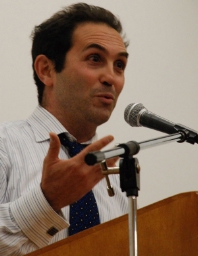http://www.today.ucla.edu/portal/ut/gaza-symposium-78973.aspx
Besides underdevelopment and strife, Gaza and Tijuana have little in common. Yet the two places have been widely juxtaposed in a question that has figured in the U.S. media’s coverage of the Gaza conflict: What would the United States do if rockets rained on it from Tijuana?

It’s “completely false” to compare an attack from Mexico – or, for that matter, Canada – with the spectacle of rockets fired from Gaza into Israel, noted English Professor Saree Makdisi, an expert on the Israel-Palestine conflict, at a Jan. 21 symposium on campus. “In the analogy, it’s never pointed out that we, of course, do not occupy Tijuana or Ottawa.”
Israel’s recent assault on Gaza by land, sea and air against the backdrop of its total control over the region since 1967 was a disturbing violation of Palestinians’ human rights, speakers at the symposium said. Titled “Human Rights and Gaza,” the well-attended public event was held at the Broad Art Center and sponsored by the Center for Near Eastern Studies and the International Institute.
Much of the public debate about the Gaza conflict has centered on whether or not Israel’s offensive was disproportionate to the rocket attacks on Israeli territory by the militant Palestinian group Hamas.
“That immediately puts Israel in the position of defending itself against provocation from Hamas,” said Richard Falk, a visiting professor of global and international studies at UC Santa Barbara. A United Nations Special Rapporteur on Human Rights, Falk is also the author of “Achieving Human Rights,” a book published by Routledge last fall.
But the notion that Israel acted in self-defense, “falsifies in fundamental ways the interaction between Gaza and Israel,” Falk added, explaining that before Israel launched its offensive on Dec. 27, Gaza was subjected to an 18-month blockade that denied Palestinians “fuel, food and medicine and brought them to a point of near-collapse.”
Moreover, the siege of Gaza amounted to “a form of collective punishment prohibited by the Geneva Conventions and a grave breach of international humanitarian law that is itself a war crime,” said Falk, adding: “That’s left out of the public understanding of how this conflict emerged.”
Hamas, he pointed out, consistently urged the continuation of its July 2008 Egypt-sponsored ceasefire with Israel and even its extension for up to 10 years. According to the respected British newsweekly, The Economist, Falk noted, Hamas proposed an extension of up to 20 years. “What is so revealing is the Israeli refusal to even acknowledge that this was a diplomatic initiative that would have probably ended any violence.”
Equally unacknowledged in U.S. media coverage is the fact that the main provocation for the conflict was not the firing of rockets from Gaza but a Nov. 4 Israeli incursion into Gaza that killed seven Palestinians and led to a Hamas response of launching more rockets.
“The use of modern weapons against an essentially defenseless society weakened by an 18-month blockade is reflected in casualty figures, which are reminiscent of colonial wars,” said Falk, pointing out that at least 1,550 Palestinian civilians have been killed in the conflict and at least 5,000 wounded. In sharp contrast, Israel lost 13 lives, including those of four soldiers from so-called “friendly fire.” Israel is accountable for the death and destruction in Gaza because international law clearly specifies the responsibilities of occupying powers in this regard, Falk said.
Another feature that emphasizes the “savagely criminal nature of this military operation is that, as far as I know, this is the first time that a civilian population has been locked into a war zone and denied the option of becoming refugees,” said Falk, adding: “This is a separate, distinct war crime.”

Along with this pattern of encirclement, “the use of sheer violence is also growing,” and the Gaza conflict is its latest and most alarming manifestation, said Piterberg.
“There is something in the wanton violence and carnage that Israel has perpetrated that is reminiscent of the excessive violence by France in Algeria during the Algerian War of Independence,” he said.





